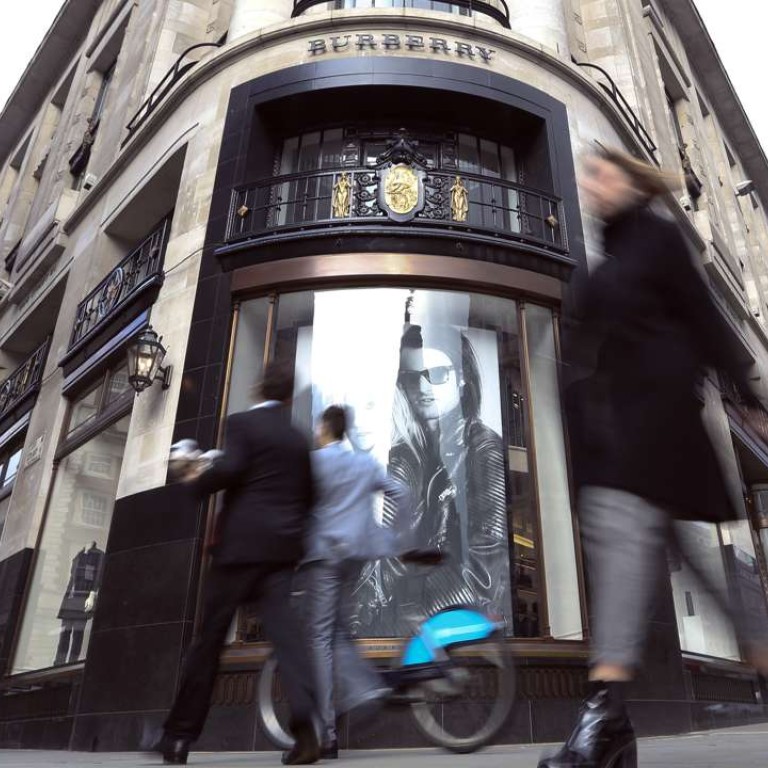
Chinese shoppers head online for British retail bargains
Brexit has sparked a flurry of marketing campaigns by e-commerce platforms, offering cut-price items
Last week’s Brexit vote in the UK has triggered an online shopping frenzy by Chinese consumers, on the hunt for British-made bargains.
The surprise result on Friday immediately sparked a flurry of marketing campaigns by e-commerce platforms, offering cut-price items.
After noticing the pound had slumped to a decades-low, Xiaoya Fu, who works at a private equity firm in Shenzhen, says she hit the online outlet of British luxury behemoth Burberry.
“A Burberry coat has become a lot more affordable now as it is priced in pounds and I get paid in renminbi,” the 25-year-old said.
“The Brexit is good news for me.”
A classic Burberry trench coat was being offered for £995, about 9 per cent cheaper than its pre-Brexit price tag.
But it’s not just enthusiastic Chinese who are clicking for British bargains.
Shoppers from around the world are taking part in the post-Brexit retail bonanza, which many internet users suspected forced the website of UK fashion retailer ASOS’s to crash for 24 hours, even without any special offers being promoted.
“Consumers passionate about buying luxury products always react swiftly to any sharp change in the value of foreign currencies,” said Xiaotang Tang, the co-founder and CEO of NoFashion.cn, a leading Chinese fashion industry news portal.
“As the Brexit became the talk of the town, both shoppers and sellers were trying their best to benefit from it.”
As the Brexit became the talk of the town, both shoppers and sellers were trying their best to benefit from it.
The rush to British retail sites, meanwhile, has also prompted their Chinese rivals to hurriedly launch their own aggressive sales promotions.
Tmall’s “Britain Marketplace”, owned by e-commerce giant Alibaba, has already launched its own “Brexit Sale”, offering an array of British-made products at steep discounts of up to 60 per cent.
With deliveries from the UK being handled by the British postal service, The Royal Mail, four cans of Aptamil “Growing Up Milk Powder” were selling on Tmall for just 598 yuan, a 58 per cent discount.
Elsewhere, a quick search on Tmall revealed British leather goods producer Cambridge Satchel offering 40 per cent discounts, and Danish shoemaker Ecco’s UK site charging 48 per cent less for its men’s sneakers.
Premium international brand names such as watchmaker Daniel Wellington, and women’s fashion house Karen Millen were also quick to launch “Brexit Sales” on their Tmall stores.
“The immediate impact has been big,” said Zhu Danpeng, associate at China Branding Research Institute.
“But some British retailers are cutting their prices too, not only because of the exchange rate fluctuations but also to reduce their inventories.”
With lingering political uncertainty hanging over the country, downgraded credit ratings and a sustained economic slowdown, few believe the slide in the British pound is coming to an end soon.

Ozsp.com, a Hangzhou-based online shopping platform specialising in selling high-end household products from Europe, is among the cross-border e-commerce sites also rolling out “Brexit deals”, as the euro suffered similar slumps to the beleaguered pound.
“Now that the euro is dropping, the prices of European goods are plummeting to rock-bottom levels,” says a red advertising banner prominently displayed on Ozsp.com’s homepage.
The site is offering a blanket 12 per cent discount on a wide range of goods.
According to the China Ecommerce Research Centre (CERC), Britain accounted for about a fifth of China’s inbound cross-border e-commerce transactions last year, orders worth 183.3 billion yuan.
“The concerns fueled by the Brexit have sparked a sweeping bargain-hunt frenzy among Chinese consumers, although that may only be short-lived,” said Zhu Qiucheng, an analyst with CERC.
But he warned that future political changes, particularly in Britain’s trading terms and commercial policies, were equally likely to cause difficulties for Chinese shoppers and cross-border online retailers of British products.
“A weaker currency is not going to offset the downside shocks of shifting pricing strategies of British suppliers in the wake of the Brexit’ ,” Zhu noted.
He predicts the prices of British consumer products currently being offered at discount will bounce back before the end of the year as the markets gradually digests the news.
NoFashion.cn’s Tang also warned the pound’s shrinking value may force British luxury brands to lift their prices longer term, as their production costs rise.
Back in Shenzhen, Xiaoya Fu says she’s already ordered a Cambridge Satchel bag, and next up will be her first Burberry coat.
“Who can predict what’ll happen this weekend,” she says.

